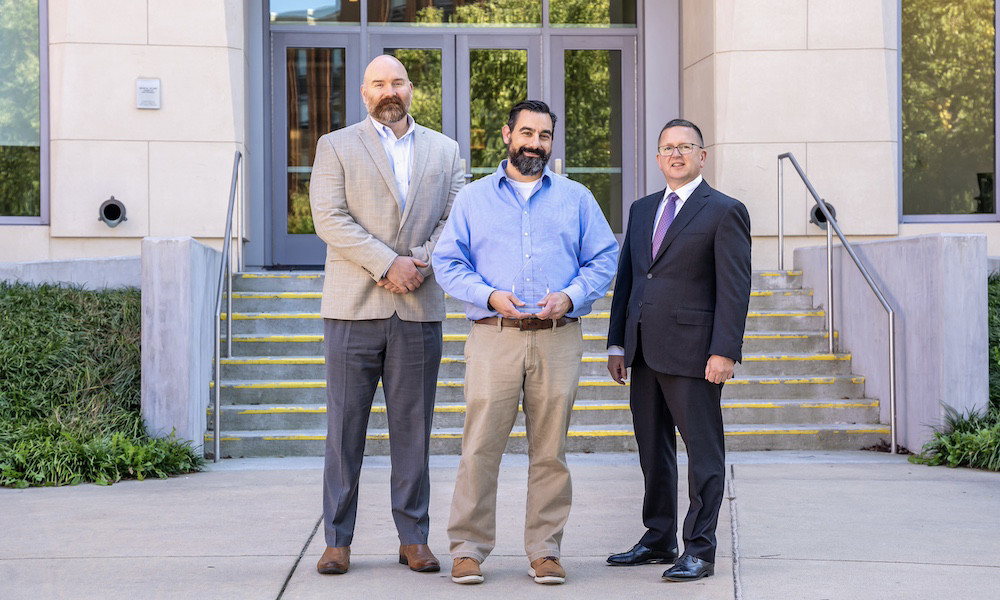JMU’s Center for Economic Education wins societal impact award
News
SUMMARY: The Center for Economic Education develops and implements a wide range of programming in local schools to promote literacy.
JMU’s Center for Economic Education (CEE) was established in 1981 for the purpose of providing Shenandoah Valley educators and students with programs designed to reinforce economic literacy. Since its founding, the center has grown through local collaborations and with the financial support of JMU’s College of Business and Your Economic Success (YES), a local non-profit. Now, the center is nationally recognized for its dedication to innovative teaching practices, community service and cultivation of economic and personal finance lessons.
“We’ve spent many hours visiting local schools, meeting with teachers and learning about their specific challenges,” said CEE Director, John Kruggel. “This hands-on approach allows us to tailor our programs and materials to meet their needs.”
The center has created a wealth of resources and lessons for use by local teachers, students and community services, which have grown in reach and scale in recent years. In September, the CEE was recognized for its outstanding performance in working with teachers and for exhibiting excellence in the delivery of high-quality programs and outreach to its community. It was awarded the 2024 Albert Beekhuis Award by the Council for Economic Education.
The CEE employs a coordinated approach in order to reach more than 17,000 students in city and county schools. Their work addresses the gaps in economic and personal finance education at the elementary and secondary levels by working with local schools and their teachers, as well as local nonprofits, to reach as many students as possible.
“This semester alone, the center’s programming has impacted 213 teachers and 14,300 students throughout the region,” said Kruggel. With several events already scheduled for the spring semester, they expect their reach to grow significantly by the end of the academic year.
Designed to engage students and make learning fun, each of the center’s programs can be placed into one of three categories: teacher-driven, student-driven or local nonprofit. These partnerships have generated positive change in the community and the impact is far-reaching. Most recently, the CEE was awarded the 2024 Southern Business Administration Societal Impact Award, which recognizes outstanding approaches or achievements in business education that have a positive impact in the community or, more broadly, in society.
The following are highlights of three such initiatives in the CEE’s programming.
Econ Explorers Boxes (EEB): This teacher-led series of self-contained curricula is designed to address the state elementary economic standards for grades 1, 2 and 3, and also provides a separate box for a classroom mini-economy program. EEBs contain class sets of any material needed throughout the unit as well as daily lessons written to address specific state standards. Center staff designed the EEBs so they could be dropped off at a school and teachers can teach the unit with little to no work on their end.
Each box is designed to fit the pacing guides developed by city and county schools and includes visual aids to help address the language barriers faced by many Shenandoah Valley students. Originally piloted with local teachers, the EEBs have greatly increased the center’s reach within the local school divisions. In 2022, the Econ Explorers Box was awarded Gold in the Curriculum Awards presented by the National Association of Economic Educators.
|
"This semester alone, the center’s programming has impacted 213 teachers and 14,300 students throughout the region." -John Kruggel, director of the Center for Economic Education |
Checking Out Your Economic Success (COYES): The center’s newest partnership with the Massanutten Regional Library system and the Waynesboro City Library involves using children’s literature and cross-curricular activities to teach a number of concepts. Developed as a way for local libraries to address the needs of the home-school population, the COYES program is modeled after the Econ Explorers Box. Each COYES box centers on a book and contains a theme with activities families can use at home. Like the EEBs, each COYES box contains the materials needed to teach the concepts addressed. Caregivers are also provided a booklet that walks them through each step, including the definitions needed, how to set up and use the activities in the box and even suggested tips to follow while reading the book to their students or children. Since the creation of COYES, the center has been approached by the Youth Services Consultant at the Library of Virginia to discuss ways to increase access to the Checking Out Your Economic Success program throughout the state.
Global Entrepreneurship Market (GEM) Fair: Each year hundreds of students in grades 2 through 5 gather on JMU’s campus for the GEM Fair. The CEE established the GEM Fair in the mid-1990s as a culminating activity for local schools’ class markets. Each year, teachers around the Shenandoah Valley conduct mini-economies in their classrooms in which students earn wages for completing various jobs. They use their wages to purchase materials to produce goods or provide services, with many of them selling their goods and services to their classmates. Students are then invited to campus to interact with other students from schools throughout the Valley. CEE staff help teachers convert student wages to a shared currency (dubbed GEMs) through simple cross-curricular math-conversion activities. Through these mini-economies, students gain valuable insight into the running of a business as well as entrepreneurial problem-solving skills. Since its creation in 1997, the GEM Fair has welcomed over 9,000 elementary students from across the Valley. Today, the GEM Fair is one of the CEE’s most successful annual programs.
